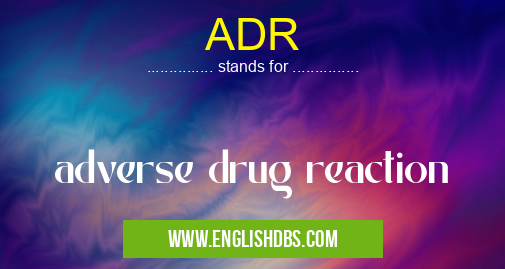What does ADR mean in MEDICAL
Adverse Drug Reactions (ADR) are unwanted side effects of medications that can result in serious problems for patients. ADRs occur when the medication interacts with other substances in the body, including other medications, food, and alcohol. They can range from mild skin rashes to life-threatening allergic reactions. Understanding these reactions and how to prevent them is essential for anyone taking any form of medication.

ADR meaning in Medical in Medical
ADR mostly used in an acronym Medical in Category Medical that means adverse drug reaction
Shorthand: ADR,
Full Form: adverse drug reaction
For more information of "adverse drug reaction", see the section below.
What is an ADR?
An Adverse Drug Reaction (ADR) is an unexpected or unintended reaction that occurs when a patient takes a medication or is exposed to a certain drug in some other way, such as through inhalation or injection. ADRs can range from minor issues such as a rash or itching, to major problems such as organ damage and even death. Many drugs have warnings about potential ADRs on their labels, but some reactions only become known after many people have taken the drug. In cases like this, doctors must act quickly to inform the public about any new information regarding potential adverse reactions before more people are affected by them.
Types of ADRs
ADRs can be classified into two main types: mild and severe. Mild ADRs include skin rashes, nausea, vomiting, headaches, dizziness and fatigue. These types of reactions are not life-threatening but they may still be uncomfortable and sometimes require treatment or changes to a patient's medication schedule. Severe ADRs are much more dangerous and may cause organ damage or even death if they go untreated. Examples of severe ADRs include anaphylaxis (a potentially deadly allergic reaction) and liver failure caused by exposure to toxic levels of certain drugs.
Prevention & Treatment of ADRs
The best way to prevent an ADR is through careful monitoring of patients taking medications and avoiding activities that put the patient at risk for developing an adverse reaction. Patients should report any unusual symptoms they experience while taking a medication to their health care provider immediately so that it can be addressed quickly if necessary. Treatment for milder forms of ADR usually involves discontinuing use of the drug or changing dosage levels until symptoms subside; however more serious cases may need additional medical intervention such as IV fluids or administration of specific antidotes in order to reverse any adverse effects caused by the drug's interaction with the body's systems.
Essential Questions and Answers on adverse drug reaction in "MEDICAL»MEDICAL"
What is an adverse drug reaction?
An adverse drug reaction (ADR) is a response to a medication that is unexpected or unintended and potentially harmful. These reactions can range from mild to severe and may include mild skin rashes, swelling or hives, or even life-threatening conditions such as organ failure.
How do I know if I have an ADR?
If you experience any symptoms that are out of the ordinary or unexpected after taking a medication, you should be assessed by a healthcare professional right away. Your doctor will evaluate your symptoms to determine whether they are related to an ADR and recommend appropriate treatment.
How common are ADRs?
ADRs are surprisingly common, with estimates indicating that they affect up to 10% of all hospitalizations in developed countries. However, it's important to note that not all adverse reactions are caused by medications; many can be due to other factors such as underlying health conditions or other drugs taken at the same time.
What causes ADRs?
ADRs can be caused by numerous factors including incorrect doses, interactions between two or more medications, interactions between certain foods or beverages and medications, allergies to certain components of the medication or ingredients used in its manufacturing process, underlying health conditions, age and gender differences in drug metabolism and genetic predispositions.
Who is most at risk for developing an ADR?
People over the age of 65 are particularly prone to ADRs as are those taking multiple prescription medications simultaneously (known as polypharmacy). Other high-risk groups include pregnant women taking medications for morning sickness, children whose bodies metabolize drugs differently than adults and people with weakened immune systems due to untreated infections.
What type of symptoms might indicate an ADR?
Symptoms vary depending on the medication taken but may include headache; dizziness; nausea; vomiting; diarrhea; rash; itching; muscle aches and cramping; swelling around the eyes, lips or throat; difficulty breathing/wheezing/tightness in chest; confusion/disorientation/hallucinations/seizures and fever/chills. If any of these occur seek medical help immediately.
Are there ways of preventing ADRs from occurring?
Yes - certain steps can be taken before taking any prescription medication that may reduce the risk of developing an adverse drug reaction such as informing your physician about all drugs you're currently taking (including over-the-counter medications), asking questions about potential side effects and alerting them about any allergies you have had in the past. Additionally making sure not eat grapefruit while taking some medications without consulting your physician first has been known to cause serious side effects.
Is it possible for someone who has experienced an ADR before to still take the same medication safely in future?
It depends on the type and severity of the reaction experienced in prior cases — persistence with regular monitoring by a healthcare professional may be recommended if only mild side effects were noted previously while alternatives may need to be explored if more serious complications occured previously.
ADR also stands for: |
|
| All stands for ADR |
